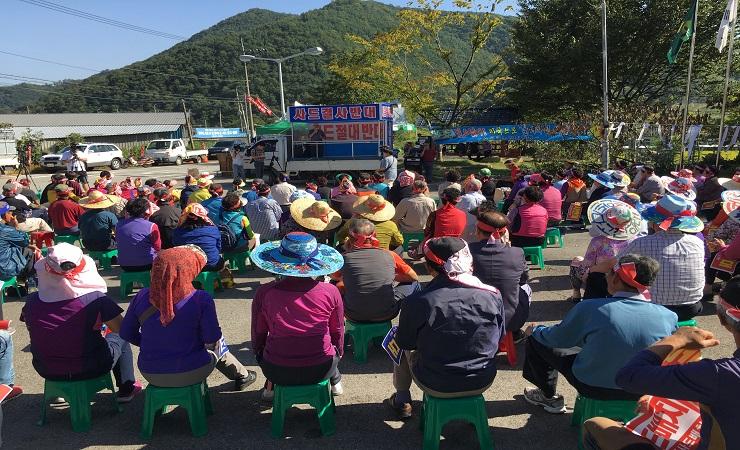ASIACALLING
South Korean village protests new US missile base in their community
"Next year, the United States military is expected to deploy a new missile shield system in South Korea that’s meant to safeguard against attacks from North Korea. But there is resistance from locals."

The few hundred residents of a South Korean village worry that their community will become a military target.
Sometime next year, the United States military is expected to deploy a new missile shield system to the area that’s meant to safeguard against attacks from North Korea.
Some villagers also claim their leaders are hiding potential health risks posed by these weapons.
The dispute highlights decades old tension between South Koreans and the American military, which stations close to 30-thousand soldiers in their country.
Reporter Jason Strother recently met some of these concerned residents and has their story from Seongjiu county, 220-km south of Seoul.
Kim Won-myung leads me into a small meditation room. The Buddhist monk lights candles and incense then bows before a shrine.
This small, tiled-roof temple surrounded by farmland is less than a kilometer away from a golf course that will be converted into a new US missile base.
The monk says this is not the right place to wage war.
“If the missiles are deployed, it will just bring us closer to war and we want peace. There are better ways to solve the problems between North and South Korea, like through dialogue. We just don’t want this missile base in our community,” says Won-myung.
The missile system is called THAAD, short for Terminal High Altitude Area Defense. And all along the road leading to the golf course are red banners saying, ‘No to THAAD’ and ‘Send the missiles back to America.’
A community center is the headquarters of the local anti-THAAD movement.
Lee Jeong-hee, a 59-year old melon farmer is getting ready to lead a protest later in the day.
He tells me security concerns is one reason why he and other villagers don’t want the missiles in their back yard. But, Lee says THAAD might be even more deadly than the government is letting on.
“The South Korean and US governments are not telling the truth about the missile system. They are not telling us how dangerous the electromagnetic waves from its radar will be to people’s health,” said Jeong-hee.
The South Korean and US militaries say THAAD does not emit dangerous electromagnetic wave levels. But, most people I spoke to in the area, believe they’ll be harmed by increased levels of radiation from the missile battery
Nationwide, opinion polls do show most South Koreans favor the deployment – though it’s hard to see that support here.
But one person I met who doesn’t buy into the radiation theory was my taxi driver, 58-year-old Shin Sang-won.
He says THAAD is a divisive issue here. Shin tells me that ever since the South Korean government selected the area to host the missile system last month, arguments keep breaking out.
So he tries to avoid the topic with his passengers.
“Hey, I am just the driver. I don’t want any problems. I only talk about it if they bring it up. I will tell them I support THAAD, if they ask,” Sang-won told me.
“I’ve never had an argument with a passenger, but a couple I picked up got into a fight in my car over the missiles.”
Some residents of Seongju and nearby Gimcheon city have shaved their heads in protest of the missiles and the mayor has gone on hunger strike.
More demonstrations are planned here and in Seoul.
45-year-old supermarket manager Kim Hee-soo has joined some of the rallies. She says she feels local anger is rising.
“So far the protests have been peaceful, but if these missiles are really brought in, I expect people will get more aggressive. I don’t want those American bastards near our town,” Hee-soo said to me.
Despite her words, the mother of two says she doesn’t have any problem with the US military – she just doesn’t want more of their weapons here.
The THAAD deployment to South Korea could re-ignite lingering anger at American forces, says Geoffrey Cain, author of a forthcoming book on the history of US bases in the country.
He says throughout the nearly 70 years that American soldiers have been stationed here, large scale protests against their presence occasionally erupts.
“The local population is often concerned about prostitution, environmental degradation and a host of other issues around the bases.”
Cain continued, “they are often concerned about allegations of unfair treatment under Korean law toward US soldiers. These concerns flare up every so often and become civil movements.”
Cain says there’s a good chance that in South Korea’s presidential elections next year, the THAAD missiles will be a campaign issue.
Back at the Seongju community center, around 100 locals are sitting on plastic stools, listening to protest leader Lee Jeong-hee speak.
Before the rally began, he told me that if plans to deploy THAAD go forward, for him, it means war.
“If these missiles are brought here, we are going to physically block the road to the base,” declared Jeong-hee.
He adds that if there are any fights between protestors and the authorities, the US is to blame.
- Jason Strother
- Seongjiu
- US military
- South Korea
- military shield
Komentar (0)
KBR percaya pembaca situs ini adalah orang-orang yang cerdas dan terpelajar. Karena itu mari kita gunakan kata-kata yang santun di dalam kolom komentar ini. Kalimat yang sopan, menjauhi prasangka SARA (suku, agama, ras dan antargolongan), pasti akan lebih didengar. Yuk, kita praktikkan!